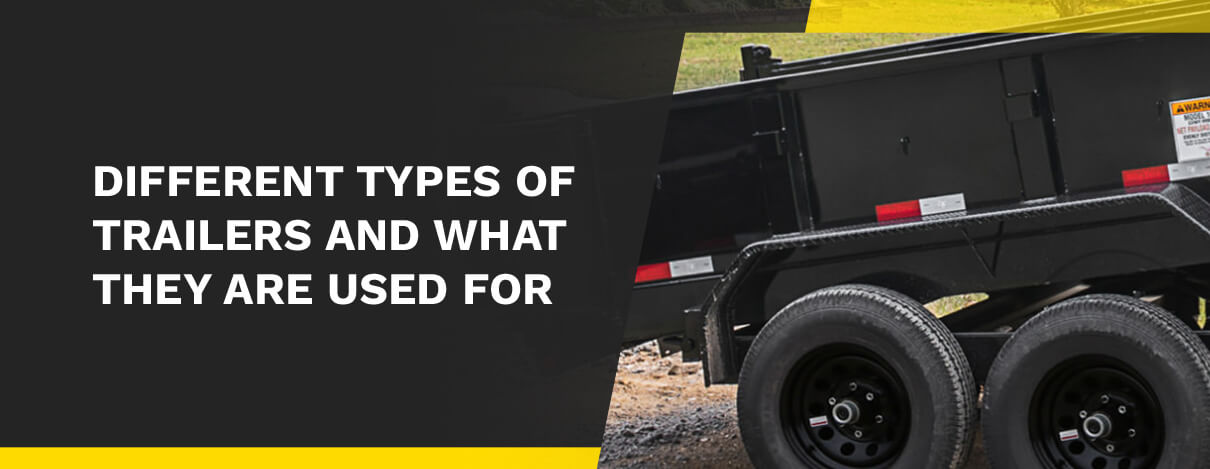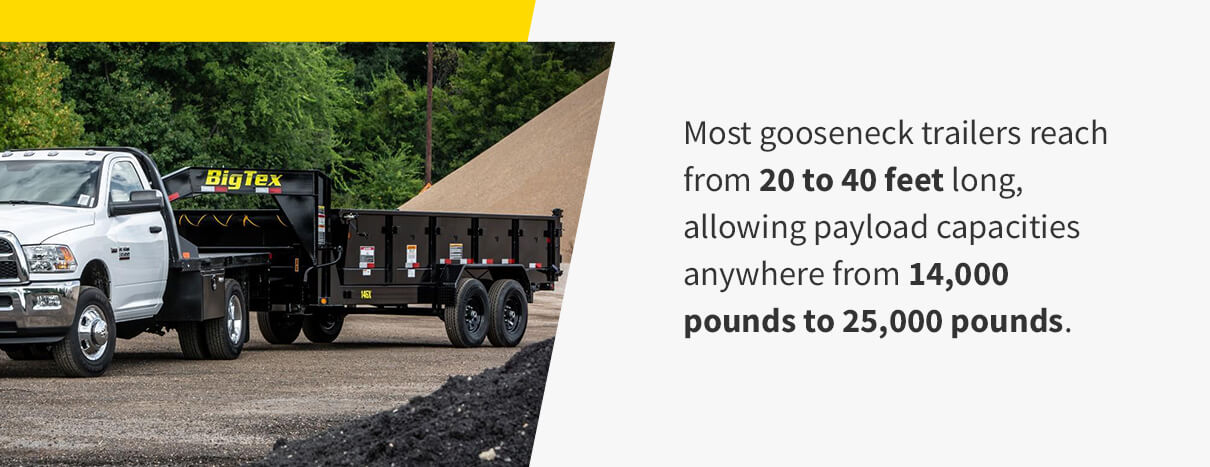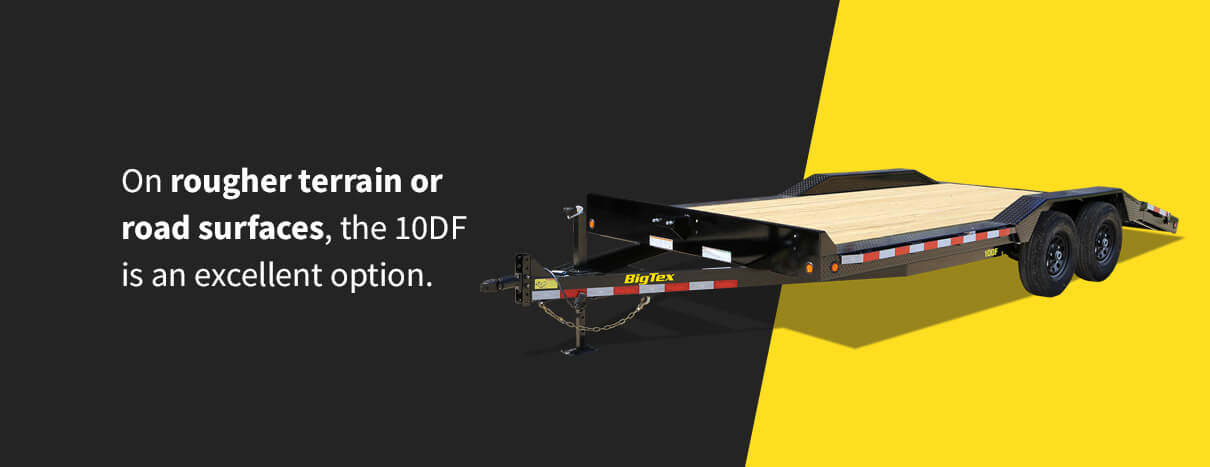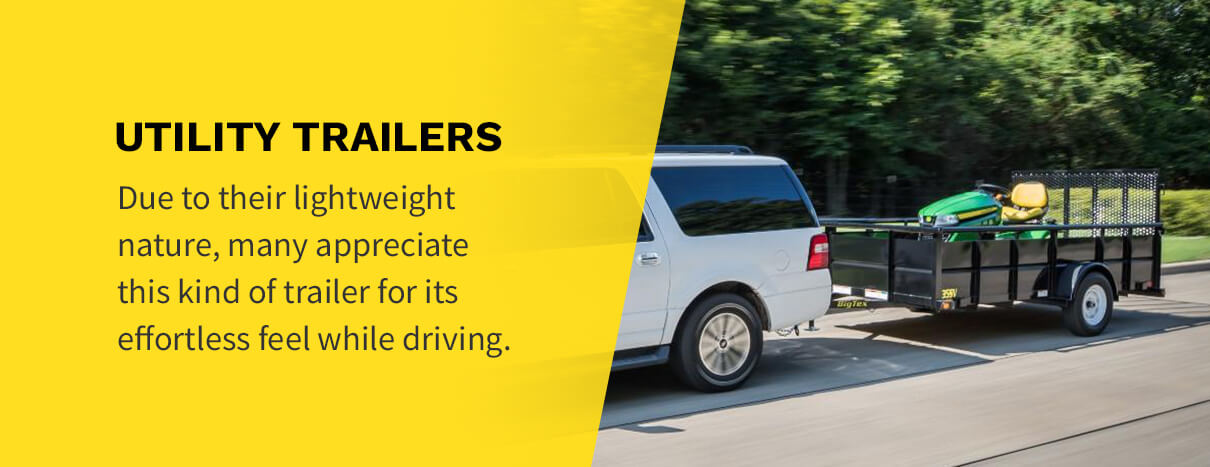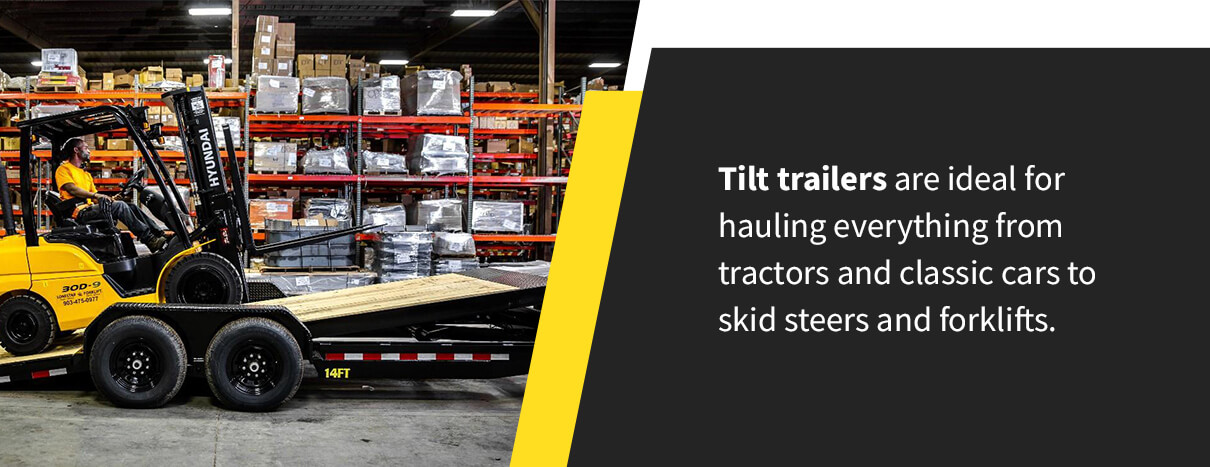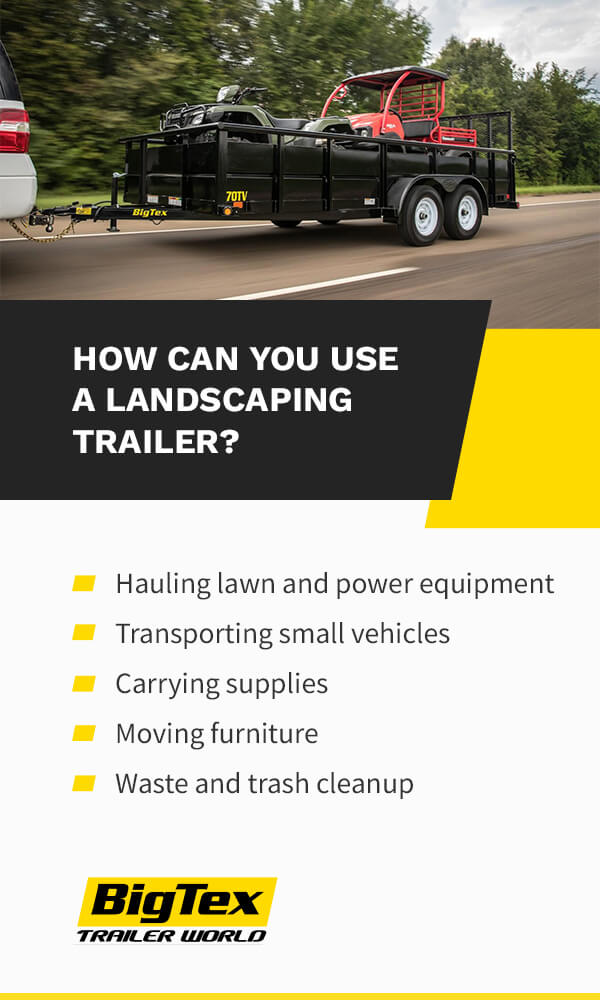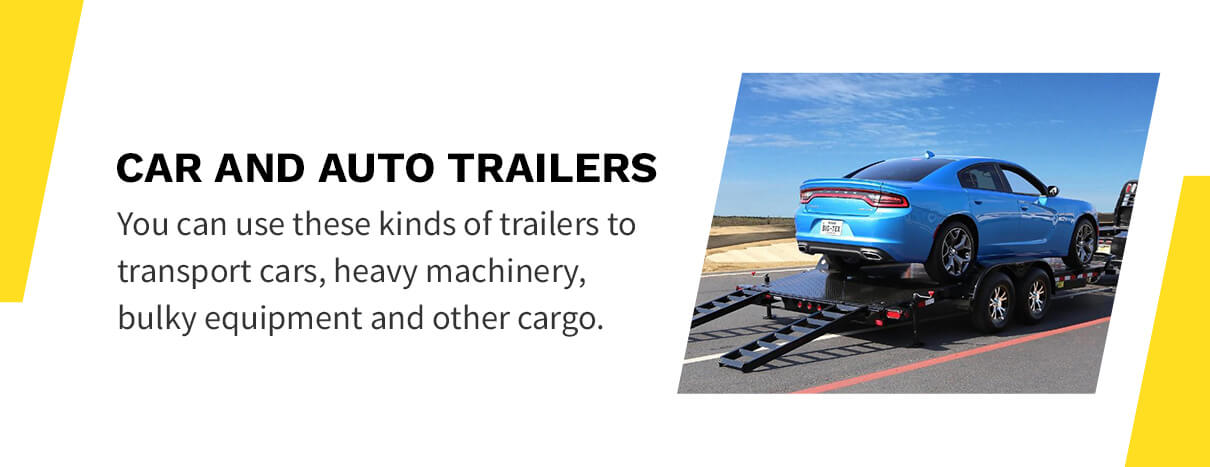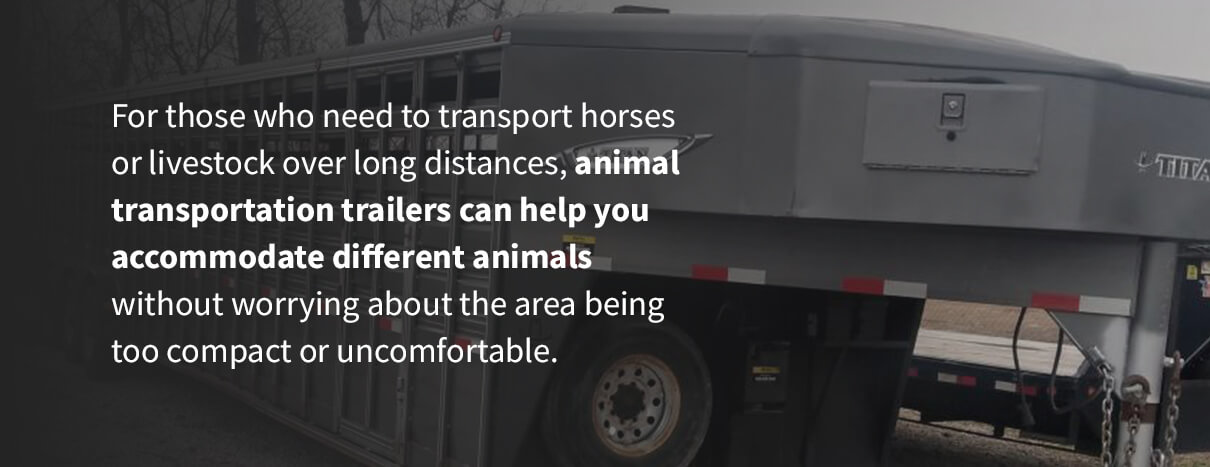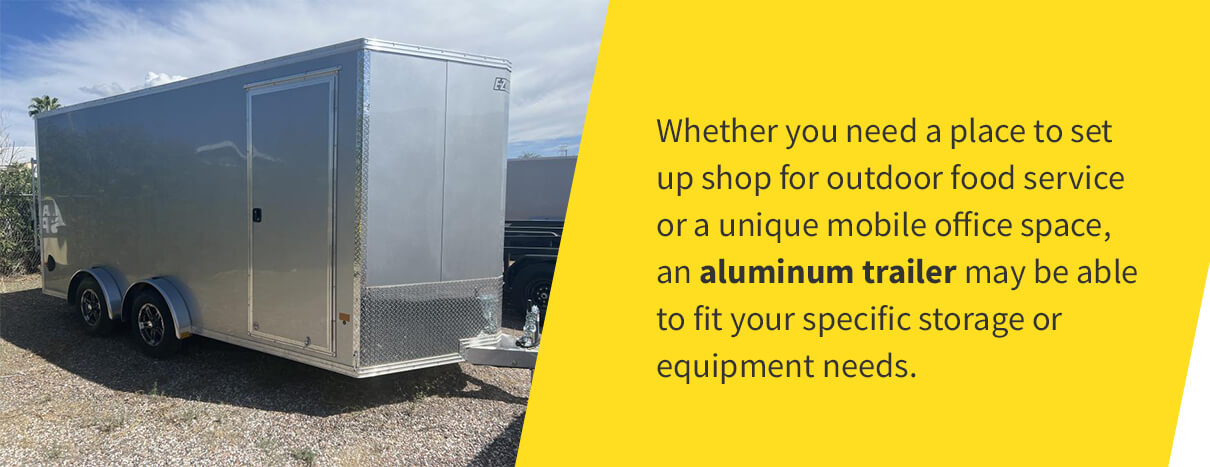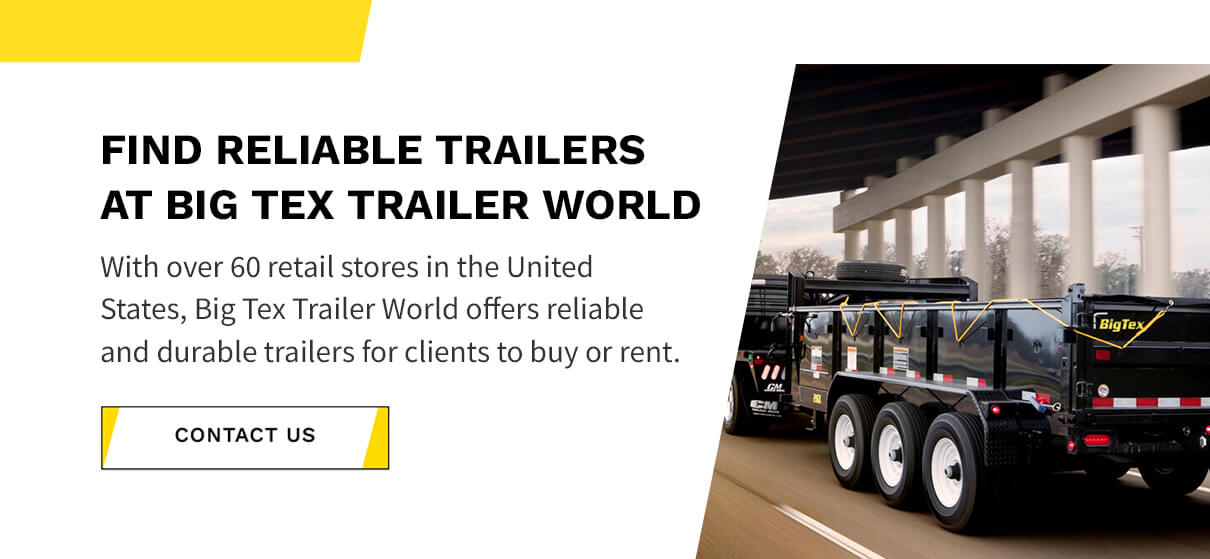Many trailers offer reliable ways to transport goods and materials, from landscaping supplies and animals to machinery and equipment. Whether you’re looking for a trailer that allows safe and accessible loading and unloading or one that drives well on the road with freedom of movement, exploring different trailer types can help you find what you need. From dump trailers, pintle hook trailers and equipment trailers to livestock or landscaping trailers, you’ll want to choose the transportation that fits your needs.
Dump Trailers
Used to haul waste and debris, dump trailers come in many different sizes and axle types with options for various hitches or gate styles. Some companies provide information about the trailer’s gross vehicle weight rating (GVWR), trailer weight or the maximum payload weight each specific trailer can handle. This information can help you find the best and safest trailer for your hauling needs.
Some of the most popular dump trailer models include variations in 10k, 12k, 14k and 16k designs. Dump trailer models include various hitch and gate types in single-axle and dual-axle options.
While the type of hitch your dump trailer needs depends on your hauling vehicle and trailer weight, some hitch types are more common than others. Some popular hitch designs to keep in mind include the following:
- A bumper pull hitch: This kind of hitch attaches to the back of your hauling vehicle. It can haul lighter loads while keeping the bed of your hauling truck open and accessible. The truck bed can then carry more items should you need extra room.
- A gooseneck hitch: A gooseneck hitch mounts to the frame of your truck and rests over the rear axle. These hitches allow for better driving balance and can handle larger loads, such as waste and debris.
- A pintle hitch: Pintle hitches use a hook on the hauling vehicle. The hook attaches to a ring on the trailer, allowing for better movement on rough roads or terrain.
Dump trailers also come with different loading gates. Some common dump trailer gates include the following:
- A side-loading gate: This kind of gate opens up from the side, allowing better access for unloading and loading waste and debris.
- A landscape spreader gate: A landscape spreader gate pulls down towards the ground to act as a loading ramp. Workers can also use the spreader gate to filter materials, debris or dirt.
- A double-action spreader gate: This kind of gate opens like the tailgate of a pickup truck or can flip upwards to make a clear path for your load.
- A rear swing-out gate: A swing-out gate swings outwards to allow easier access to hauling materials.
Gooseneck Trailers
Gooseneck trailers contain a hitch that curves upwards and out over the hauling vehicle. The hitch connects to a ball mount fixed inside the bed of the hauling truck. The ball mount attached to the truck’s frame often sits over the vehicle’s rear axle, allowing for excellent stability during drives.
Most gooseneck trailers reach from 20 to 40 feet long, allowing payload capacities anywhere from 14,000 pounds to 25,000 pounds. These kinds of trailers have different applications and various design options. Some models include the following:
- Dump trailers: Gooseneck dump trailers use hydraulic hoists, allowing for efficient and durable unloading and loading.
- Lowboy trailers: With lower trailer beds and a fixed drop ramp, the lowboy gooseneck trailer makes loading and unloading easier and more accessible.
- Mega-ramp trailers: These gooseneck trailers are excellent for loading and unloading heavy equipment and machinery. They use two ramps to form a full ramp and make it convenient to move wider equipment.
What Can You Use A Gooseneck Trailer For?
Because gooseneck trailers often have more space and broader capabilities, they are excellent for heavy machinery or heavy-duty equipment. With larger payload capacities, gooseneck trailers allow you to haul various large and hefty materials and objects. A gooseneck trailer in any model makes for a safe and accessible option thanks to its versatile and stable hitch connection.
Pintle Trailers
Pintle trailers use a lunette ring attached to the front of the trailer, which connects to a pintle hook on the rear bumper of your hauling truck. The pintle hitch allows more freedom of movement, making for easier turns. Pintle trailers still have a secure connection and are suitable for hauling heavy objects over rough terrain.
Many pintle trailers can also handle more weight than other trailer types, making them ideal for hauling heavier materials and products. With single- and dual-wheel options and heavy-duty axle models, pintle trailers are ideal for agricultural use or farm product hauling. Pintle trailers are also appropriate for transporting large oil field or agricultural equipment due to their larger hauling capacity.
Equipment Trailers
Equipment trailers are used to haul heavy equipment and machinery like automobiles, building materials, service and farming equipment, and other oversized items that other trailers may not be able to handle. While equipment trailers are available in many variations, some popular models include the following:
- Lightweight equipment trailer: These trailers are made with lighter materials to make it easier to drive and save money while transporting equipment and materials.
- Pipe-rail equipment trailer: These equipment trailers allow you to transport large or tall items easily without worrying about the equipment moving or experiencing damage.
- Heavy-duty equipment trailer: These trailers are designed to transport heavy or bulky machinery and equipment over long distances.
- Low-boy equipment trailer: Lowboy trailers sit close to the ground, making it easier to load and unload large equipment.
Big Tex Trailer World offers reliable equipment trailers, including the Big Tex 10DF, 12PT and 14DF models. The 10DF is a reliable and durable hauler that offers extra stability during the drive. On rougher terrain or road surfaces, the 10DF is an excellent option. The Big Tex 12PT trailer uses tandem axles to make loading, unloading and hauling materials from job sites or fields easier. Big Tex 14DF’s wide deck gives you plenty of cargo room, making it an excellent choice if you haul heavy-duty equipment.
Cargo and Enclosed Trailers
Perhaps you must travel across states and move lots of equipment or furniture. Other companies and businesses may need to haul large equipment for their construction, farming or machine services. In many cases, a cargo or enclosed trailer is one of the best ways to haul this equipment. Often made from steel or aluminum, cargo and enclosed trailers provide a high level of versatility and safety.
Cargo and enclosed trailers come in various designs, such as a wedge, flat front or round or flat top parts. Whether you need the trailer for moving, transporting landscaping materials, storing products or hauling construction materials, a cargo or enclosed trailer can help keep your objects safe while allowing for freedom of movement on the road.
Utility Trailers
Another excellent trailer type is the utility trailer. Many appreciate the utility trailer’s versatility, lightweight features and cost-effective nature.
For example, utility trailers can transport many goods and products long distances. Your trailer may also be able to handle bulky materials or load and unload awkwardly shaped items. You can rest assured that your items will remain safe and secure throughout your trip.
The few amounts of materials in utility trailers make them weigh less than other models. Due to their lightweight nature, many appreciate this kind of trailer for its effortless feel while driving. In many cases, businesses can also save on fuel while driving long distances.
Types of Utility Trailers
Utility trailers come in single-axel and dual-axle variations, with various pipe rail or wall configurations and gate and ramp styles.
- Single- and dual-axle models: Single-axle trailers can maneuver effectively across long distances and save on fuel through less gas consumption. You’ll also spend less on replacement tires, brakes or other maintenance fees. Dual-axle trailers provide heavy-duty solutions due to their higher payload capacity and improved stability.
- Pipe rails and walls: Some utility trailers have low-profile pipe rails or taller walls. Utility trailers with rails or walls offer reliable protection and support that many appreciate when hauling products.
- Gate and ramp styles: Perhaps you need to transport equipment and machinery like motorcycles, ATVs or RVs. Utility trailers are available in various gate and ramp styles to help you safely unload and load different vehicles and keep them safe during transportation.
Tilt Trailers
Many companies enjoy tilt trailers for their smooth driving capabilities and built-in gravity tilt or hydraulics. Tilt trailers are designed to allow for easier loading and unloading of other vehicles or equipment. These trailers are ideal for hauling everything from tractors and classic cars to skid steers and forklifts.
Including torsion-axle suspensions means that the trailer will need less maintenance over time while still keeping a smooth ride over long distances. With full-tilt trailers, the deck can be used as a ramp to fit bigger pieces of machinery and equipment. Other trailers come with scissor-like hydraulic configurations, allowing for efficient driving, stable operation and a large capacity. Over-the-axle models with only one axle are best for transporting compact or lightweight equipment.
What Can You Use A Tilt Trailer For?
A tilt trailer is most helpful in transporting other types of small vehicles. Loading and unloading vehicles are also safer and faster with a tilt trailer specially designed to handle heavy equipment. The tilt deck makes it easy to manage the machinery, regardless of size or shape.
Landscaping Trailers
Landscape trailers are built to perform specific tasks and haul landscaping materials like yard waste, tools or hazardous chemicals. Some include unique tools and designs to help carry your equipment wherever you need them. For example, some landscapers enjoy a trailer with racks for weed wackers, rakes and shovels; lock boxes; or mesh siding to prevent damage.
How Can You Use A Landscaping Trailer?
A landscaping trailer has many uses aside from transporting tools or equipment. Many landscaping companies appreciate these trailers for their versatility and durable design. Some uses for a landscaping trailer include the following:
- Hauling lawn and power equipment: These may include lawnmowers, power tools or other equipment. A landscaping trailer specifically designed with organized areas for different devices can make it easier to transport lawn equipment.
- Transporting small vehicles: Powersport equipment and small vehicles like ATVs, dirt bikes or side-by-sides can fit in a landscaping trailer. Transporting these vehicles in this kind of trailer can also cost less.
- Carrying supplies: Landscaping trailers are also suitable for carrying landscaping and construction supplies, including mulch, soil, rocks, bricks and wood.
- Moving furniture: Perhaps you need a reliable trailer to move some furniture or appliances long distances.
- Waste and trash cleanup: Some landscapers may want to transport waste or trash from a job site. These may include grass, compost, wood shavings or leaves. Cleaning can be easier with a landscaping trailer made to contain large amounts of debris.
Car and Auto Trailers
Some customers may be looking for a new trailer to transport their cars or special automobiles. Car and auto trailers have lower and broader beds, higher payload capacities, and tandem axles to carry large loads. You can use these kinds of trailers to transport cars, heavy machinery, bulky equipment and other cargo.
Some types of car trailers come with unique features to fit your needs, such as:
- Lockboxes: These provide a place to store your car tools and small materials securely.
- Ramps: Rear slide-in ramps help you easily and safely access your trailer.
- Pockets: Tie-down pockets allow you to keep your equipment and cars in place during long rides.
- Chrome wheels: Some companies may allow for unique additions like chrome wheels.
Car and auto trailers also come with different hitch types that you may want to explore. The different kinds of cars and auto trailer hitch types include the following:
- Bumper pull hitch: The bumper pull hitch attaches to your hauling vehicle’s bumper and leaves your truck bed free for extra materials or tools.
- Gooseneck hitch: The gooseneck hitch uses a ball mount installed within the truck bed. These hitches allow for better towing stability and come in two-car, three-car or higher capabilities.
- Pintle hitch: Pintle hitches use a hook on the hauling vehicle and a lunette ring on the trailer. Many who work in construction or agriculture use pintle hitches to allow for better freedom of movement.
Horse and Livestock Trailers
For those who need to transport horses or livestock over long distances, animal transportation trailers can help you accommodate different animals without worrying about the area being too compact or uncomfortable. Whether you run a farm or are into trail riding or competing, you can find a horse or livestock trailer with front tack rooms, drop-down feed doors and saddle racks.
Some farmers or those in livestock operations like trailers that can accommodate various sizes of animals. Regardless of your operation needs or budget requirements, you should be able to find a livestock trailer to fit your needs. You can find these kinds of trailers in bumper-pull, gooseneck, open or walled designs.
Race Trailers
Race trailers are designed to transport important racing cars and gear across long distances. Race cars require specific gear, tools and transportation to ensure they aren’t damaged before participating in the race. Packing up several race cars and all their gear in a trailer can be easy, including tires, pumps, replacement parts, clothing and protective equipment.
Other race trailers come with unique aspects, including the following:
- Back doors: Reinforced back doors ensure you can enter and exit the trailer easily while keeping your race car safe when not in use.
- Ramps: Ramps help you quickly unload and load your trailer when it’s time to pack up or prepare for the race.
- Flooring hooks: Flooring hooks ensure you can secure your race car to the trailer’s floor. This prevents the car from slipping and sliding or experiencing damage before an important race.
- Climate control: Climate control within the trailer helps prevent damage to materials and gear while protecting your race car’s machinery.
- Tool spaces and cabinets: If you need extra room for gear, tools and clothing, many race trailers come equipped with additional storage spaces and cabinets that can fit your materials and make it easier to transport lots of items.
Aluminum Trailers
For those who want a lighter and more maneuverable trailer type, you may consider investing in an aluminum trailer. Many come with ramp doors, bi-fold tailgates or other exciting features that make them worth consideration. Aluminum trailers come in various shapes, sizes and designs, from enclosed cargo or utility trailers to horse, livestock or car trailers.
Whether you need a place to set up shop for outdoor food service or a unique mobile office space, an aluminum trailer may be able to fit your specific storage or equipment needs. Perhaps you want side doors for easy interior access, or you’re looking for a more open-style design for car hauling.
You can rest assured that many aluminum trailer models can protect your equipment and tools from damage with enclosed or open designs. Big Tex Trailer World also offers specific aluminum models with V-nose shapes, galvanized finishing or wooden decks.
What Are the Benefits of an Aluminum Trailer?
An aluminum trailer’s best benefits are its durability and strength. Aluminum is very strong and, when combined with other materials to create a trailer, can be one of the lightest and most durable metals today. Aluminum is also very flexible, and once bent, it is easier to return to its original state than other metals. You may be worried about rust or corrosion over time with other kinds of trailers, but aluminum trailers resist rust and need less maintenance over the years.
Another great benefit to aluminum trails is their lightweight features. Your towing vehicle may be a significant factor in what kind of trailer you can buy. Aluminum offers a lighter solution than other metals like steel, allowing you to save money on fuel and maintenance costs for your tires or engine.
Find Reliable Trailers at Big Tex Trailer World
With over 60 retail stores in the United States, Big Tex Trailer World offers reliable and durable trailers for clients to buy or rent. Our company also services any trailers you currently have to help you keep up with maintenance and parts replacement needs. At Big Tex Trailer World, we can help you find the best trailer to meet your requirements and needs. We have one of the largest selections of trailers, from dump, equipment and landscaping trailers to gooseneck, livestock and cargo trailers. Contact us today to speak to a Big Tex Trailer World representative, or call us at 888-885-1005.
